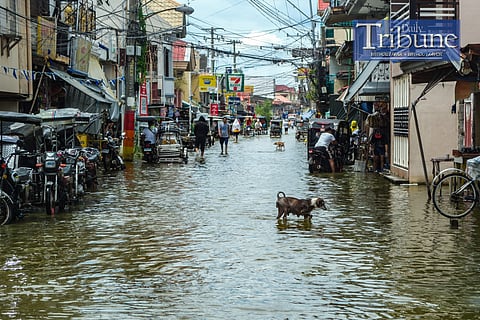
- NEWS
- the EDIT
- COMMENTARY
- BUSINESS
- LIFE
- SHOW
- ACTION
- GLOBAL GOALS
- SNAPS
- DYARYO TIRADA
- MORE

Amid the relentless southwest monsoon (habagat) rains enhanced by a triad of tropical cyclones — Crising, Dante, and Emong — nearly half a million Filipino families are reeling from widespread flooding, infrastructure collapse, and growing social unrest.
The Climate Conflict Action (CCAA), an independent research and advocacy organization, noted that the devastation has led multiple provinces in Northern Luzon and several cities in Metro Manila to declare a state of calamity, as the country confronts not just rising waters but rising tensions.
In its data gathering released on Saturday, CCAA warns that the Philippines' traditional disaster response framework is dangerously outdated.
As climate shocks intensify in frequency and overlap in timing, so too does their potential to fracture already vulnerable communities.
“Severe, prolonged rainfall is no longer an anomaly but the new norm,” the CCAA statement reads. “Yet our disaster response systems are straining under the weight of simultaneous, extended emergencies.”
The CCAA report underscored an alarming trend, pointing out that the natural disasters are no longer “just” natural. They are fast becoming conflict accelerators, it noted.
According to CCAA, signs of social strain are already visible on the ground:
Unequal Aid Access: In flood-ravaged areas like Manila, aid efforts have disproportionately favored those who can physically reach evacuation centers. Meanwhile, thousands remain stranded in inundated homes, with tensions flaring over perceived inequalities in relief distribution.
Evacuation Center Flashpoints: Overcrowding and insufficient planning have turned some shelters into breeding grounds for frustration and rivalry between evacuee groups.
Climate Migration Pressures: As farmlands vanish under water and homes are swept away, displaced families are relocating to host communities—stretching public services and sparking disputes over land and resources.
Infrastructural Failures: Projects like Quezon City’s MRT-7 extension have been linked to worsening urban runoff. Though government and private stakeholders acted swiftly to mitigate the damage, the incident highlights the broader need for climate-resilient infrastructure planning.
The CCAA urged national and local leaders to rewrite the disaster playbook to stem the tide of future disasters—both environmental and social
Among their recommendations include:
Conflict-Sensitive Relief Operations: Embed peacebuilding into all aspects of disaster response, from aid distribution to shelter management, to prevent relief efforts from becoming flashpoints.
Localized Command Systems: Empower barangays and municipalities with the tools and autonomy to act swiftly on early warnings, rather than waiting for centralized directives.
Geospatially Tailored Flood Management: Ditch the one-size-fits-all flood control plans in favor of strategies customized to local terrain, climate risks, and drainage patterns.
Whole-of-Government Coordination: Mobilize unified responses from agencies like DENR, DILG, DPWH, and AFP to prevent duplication and ensure resources reach where they’re needed most—fast.
Meanwhile, the CCAA cited the efforts of local government units (LGUs) such as San Juan City for taking proactive steps in improving weather monitoring, boosting inter-agency coordination, and refining public communication systems.
However, it cautioned that LGUs, however innovative, cannot go it alone.
“True resilience requires a clear national mandate, sustained funding, and robust oversight from the highest levels of government,”it stated.
Quoting the Department of Environment and Natural Resources’ slogan—“Nagbabago na ang Panahon, Panahon na para Magbago”—CCAA emphasized that climate change is forcing a fundamental rethink of disaster governance.
As floodwaters inch higher and storm seasons grow longer, CCAA’s message is stark but clear: unless the Philippines shifts from reactive to proactive, from fragmented to coordinated, from technical fixes to community-anchored approaches, it risks not only deeper damage—but deeper divisions.
“The Filipino spirit of bayanihan endures,” the statement concludes. “But without decisive, conflict-sensitive action, today’s floods risk becoming tomorrow’s flashpoints.”
The CCAA noted that “the playbook must change because the climate already has.”
“It is time for our disaster response to evolve, from purely reactive relief to proactive prevention, from siloed commands to seamless coordination, and from technical fixes to community‑anchored, conflict‑aware strategies. The lives, stability, and social cohesion of our most vulnerable communities depend on nothing less.”
